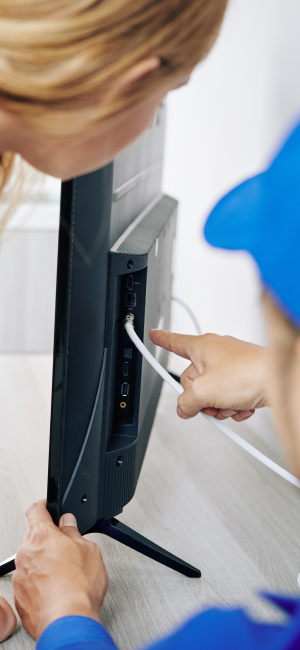Why you should compare cable TV providers and packages

Amanda Morgan

TV providers are widely available in the US today, offering various TV plans and TV packages with more channels than you could imagine. But, which provider is the best one for you? We know comparing different providers sounds like a task, but it doesn't have to be anymore! But fear not, we're here to help! HomeLinkd is here to guide you in your provider comparison journey – making sure you have all the information you need to make an informed choice. We give you the latest on what TV providers offer, how you can find providers in your area to help you find the deal that's best for you.
What types of TV services are available near me?
The first place to start is by checking out the types of TV service providers available in your area. The most common type of provider is cable, which delivers digital TV through cable lines. Satellite and fiber providers are also available in many areas, but they may not be as widely available as cable.
What's the difference between cable, satellite, and fiber providers?
Cable is a TV service that uses a system of coaxial cables or hybrid fiber-coaxial cables to deliver programming to your TV, whilst satellite providers offer TV connection services that deliver programming to your device via a satellite dish. Lastly, fiber is a type of subscription TV service that uses a system of fiber-optic cables to deliver programming to your TV. You can delve deeper into their differences here.
What are the benefits of each type of service?
Cable:
- Offers a wide selection of channels, including local channels and live sports channels
- Cable companies offer discounts when you bundle cable with internet service
- Cable is widely available in the US
Satellite:
- No need for cable lines or installation
- Best for rural areas
- Offers a wide selection of channels, including local channels
- Satellite companies offer discounts when you bundle satellite with internet service
Fiber:
- Offers high speeds and low latency, making it great for gaming or streaming movies and TV shows
- Often bundled with TV and phone service for additional savings
- Fiber is widely available in the US
What are the disadvantages of each type of service?
Cable:
- Cable lines can be damaged by severe weather, resulting in outages
- Cable companies may charge installation and equipment fees
Satellite:
- Satellite dishes must have a clear view of the sky, so trees or buildings may block the signal
- Severe weather can affect satellite signals
Fiber:
- Requires professional installation
- Not widely available in the US as cable and satellite TV service
How to find the best TV providers in your area
The best way to do this is by using HomeLinkd's provider search tool. Simply enter your zip code and we'll show you the TV providers available in your area, as well as their plans, prices, and channels. Once you've found a few providers that interest you, it's time to compare them side-by-side to see which one is the best fit for you. HomeLinkd makes it easy to compare providers by offering a comparison chart that includes key information like price, channels, and features.
What factors should I compare when choosing a TV provider?
1. Price: Obviously, you'll want to choose a TV provider that offers a plan that fits within your budget. But, be sure to compare the prices of similar plans between different providers to make sure you're getting the best deal.
2. Channels: One of the most important factors to consider when choosing a TV provider is the number and type of channels they offer. Make sure the provider you choose offers the channels you want, including your local channels.
3. Features: TV providers offer a variety of features that can enhance your viewing experience. Some features, like DVR service, may come at an additional cost, while others, like on-demand content, may be included in your plan. Compare the features offered by different providers to find the one that's right for you.

Compare TV Providers: HomeLinkd's Recommended TV Providers
We've done the research for you and have compiled a list of the best TV providers available. To make your decision easier, we've included key information like price, channels, and features in our comparison chart. Take a look at our top recommendations and find the perfect TV provider for you.
DirecTV by AT&T
Available Channels: 330+ channels
Connection Type: Satellite
Can It Be Bundled With Internet? Yes
Plans from DirecTV include its basic select plan, for 330+ channels, and its premier plan, for 315+ channels, including HBO and Showtime. You can also add premium channels like NFL Sunday Ticket to your DirecTV package for an additional fee.
Verizon Fios TV
Available Channels: 140+ channels
Connection Type: Fiber
Can It Be Bundled With Internet? Yes
Verizon Fios TV plans start at 140+ channels and go up to 425+ channels. You can also add premium channels like HBO, Showtime, and Cinemax to your Verizon Fios TV package for an additional fee. If you're looking for the fastest speeds available, you can also get Verizon Fios TV with Verizon Fios internet service.
Comcast XFINITY TV
Available Channels: 140+ channels
Connection Type: Cable
Can It Be Bundled With Internet? Yes
Comcast XFINITY TV plans start at 140+ channels and go up to 220+ channels. You can also add premium channels like HBO, Showtime, and Cinemax to your Comcast XFINITY TV package for an additional fee. If you're looking for the fastest speeds available, you can also get Comcast XFINITY TV with Comcast XFINITY internet service.
Spectrum TV
Available Channels: 125+ channels
Connection Type: Cable
Can It Be Bundled With Internet? Yes
Spectrum TV plans start at 125+ channels and go up to 200+ channels. You can also add premium channels like HBO, Showtime, and Cinemax to your Spectrum TV package for an additional fee. If you're looking for the fastest speeds available, you can also get Spectrum TV with Spectrum internet service.
Frontier FiOS TV
Available Channels: 140+ channels
Connection Type: Fiber
Can It Be Bundled With Internet? Yes
Frontier FiOS TV plans start at 140+ channels and go up to 340+ channels. You can also add premium channels like HBO, Showtime, and Cinemax to your Frontier FiOS TV package for an additional fee. If you're looking for the fastest speeds available, you can also get Frontier FiOS TV with Frontier FiOS internet service.
Cox TV
Available Channels: 140+ channels
Connection Type: Cable
Can It Be Bundled With Internet? Yes
Cox TV plans start at 140+ channels and go up to 300+ channels. You can also add premium channels like HBO, Showtime, and Cinemax to your Cox TV package for an additional fee. If you're looking for the fastest speeds available, you can also get Cox TV with Cox internet service.
Sling TV
Available Channels: 30+ channels
Connection Type: Internet
Can It Be Bundled With Internet? No
Sling TV is an affordable, cable-like streaming service that offers 30+ channels, including ESPN. You can also add premium channels like HBO for an additional fee. If you're looking to save even more money, you can get Sling TV with an antenna for free local channels.
YouTube TV
Available Channels: 70+ channels
Connection Type: Internet
Can It Be Bundled With Internet? No
YouTube TV is a cable-like streaming service that offers 70+ channels, including locals in many areas. You can also add premium channels like Showtime for an additional fee. YouTube TV does not require a contract, so you can cancel at any time.
How much does cable TV cost per month?
The average cable TV bill in the U.S. is $99 per month, according to a report from Leichtman Research Group. This figure includes all taxes and fees, and does not include equipment or installation costs. However, there are ways to bring costs down and save like bundling your TV and internet.
Channel lineup: What channels come with cable TV?
The number of channels available with cable TV varies by provider, but the average cable TV package includes around 10-15 popular networks, such as ESPN, CNN, and HGTV. Some providers also offer premium channels, such as HBO or Showtime, for an additional fee.

Satellite TV providers vs cable providers vs streaming TV services: Which is better?
There is no one-size-fits-all answer to this question, as the best TV provider for you will depend on your individual needs and preferences. However, we can compare the three main types of TV providers – cable TV, satellite TV, and streaming TV services – to help you decide which is the best fit for you.
Cable TV is typically the most expensive option, followed by satellite TV and then streaming TV services. However, cable TV does have some advantages over the other two options. For example, cable TV offers a wider selection of TV channels than both satellite TV and streaming TV services. And if you're looking for the fastest speeds available, you can get them with cable TV.
Satellite TV is a good middle-ground option, offering a wider selection of channels than streaming TV services, but not as many as cable TV. And while satellite TV does require a contract, you can usually get a better deal on your monthly bill if you bundle it with internet service.
Streaming TV services are the most affordable option, and they don't require a contract. However, they do have some disadvantages. For example, they often have a smaller selection of channels than cable TV or satellite TV. And while they offer the convenience of watching TV without a cable or satellite subscription, you may need to pay for an internet connection in order to use them.
So, which is the best TV provider for you? It really depends on your individual needs and preferences.
Frequently Asked Questions
What internet speed do I need to stream live TV?
For live TV streaming services, you will need a generally fast internet connection with a minimum download speed of 10 Mbps.
Can I bundle my TV and internet?
Yes, you can bundle your TV and internet service together. Many internet providers charge customers a discounted rate when they bundle their internet services with TV services, phone services, or both.
How can you find the best plans in your area?
The best way to find the best TV and internet plans in your area is to use a comparison tool like HomeLinkd. With HomeLinkd, you can easily compare different plans side-by-side to find the one that's right for you.
What is FiOS TV?
FiOS TV is a cable service offered by Verizon. FiOS TV offers a wide selection of TV options, including locals in many areas, and does not require a contract.
What do you get with basic cable packages?
Basic cable packages typically include around 10-15 popular sports and movie channels, such as ESPN, CNN, and HGTV.
Get great TV from the top TV companies with HomeLinkd
HomeLinkd offers an easy way to find and compare internet and TV service providers. Aiming to provide customers with the widest selection of TV and internet brands, all the information you need on what’s available in your area. So if you're looking to enhance your TV experience, find the best cable TV provider, the best satellite TV provider, or the best streaming TV service, be sure to check out HomeLinkd. We'll help you find the perfect TV plan for your needs and budget.










